| Srl | Item |
| 1 |
ID:
062592


|
|
|
| 2 |
ID:
160864
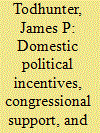

|
|
|
|
|
| Summary/Abstract |
Powerful states have numerous resources that can be mobilized in mediation processes. However, evidence suggests that such states are not more likely to be successful than other mediators. This article examines U.S. mediations through the lens of foreign policy decision making and argues that leaders make foreign policy decisions primarily with their domestic consequences in mind. Further, it contends that presidential administrations seek to build a record of success in order to improve their domestic political fortunes based on the policy options available to them. The study tests two explanations of foreign policy substitution based on domestic conditions and institutional configurations, the “party cover” and “policy availability” arguments, for U.S. mediations from 1945–1999. Results for the party cover argument are more robust, suggesting that domestic conditions play an important role in the decision to engage in mediation and imply that successful mediation is secondary to domestic politics.
|
|
|
|
|
|
|
|
|
|
|
|
|
|
|
|
| 3 |
ID:
142077
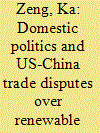

|
|
|
|
|
| Summary/Abstract |
In this article I draw on the two-level game approach to analyze the influence of domestic politics on US-China trade disputes in alternative energy, especially in solar energy. I suggest that the difficulty Washington faces in getting China to address market access barriers in alternative energy needs to be viewed in light of both the coalitional dynamics in the United States resulting from the specific bilateral trade and investment relationship in this sector and Beijing's willingness to use industrial policy to foster economic competitiveness in nascent industries. Specifically, as China occupies the middle of the supply chain in the solar industry, both downstream users of low-cost Chinese imports and exporters of upstream products to China have voiced strong concerns about US trade action. Such domestic opposition, coupled with the importance of industrial policy for defending the country's long-term interests in a “strategic emerging” sector such as alternative energy, substantially constrains Washington's ability to influence Chinese policies.
|
|
|
|
|
|
|
|
|
|
|
|
|
|
|
|
| 4 |
ID:
145044
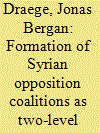

|
|
|
|
|
| Summary/Abstract |
This article investigates coalition patterns between two main factions of the Syrian opposition before and after the 2011 uprising. The two factions united over common platforms on several occasions following the 2000 Damascus Spring, but failed to do so in 2011 despite repeated domestic and international pressure. Drawing upon two-level game theory to explain this change, this article argues that increased interest from both domestic and international audiences after 2011 made the two factions less flexible in negotiating a unified platform. Thus, paradoxically, it was increased pressure for unification that deterred the opposition factions from unifying.
|
|
|
|
|
|
|
|
|
|
|
|
|
|
|
|
| 5 |
ID:
141190
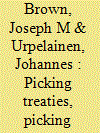

|
|
|
|
|
| Summary/Abstract |
International treaty negotiations and domestic politics are interrelated. We show that negotiators can strategically select treaties to mobilize domestic interest groups and support particular candidates for office. Interest groups will support (oppose) political parties that will ratify treaties benefiting (harming) them. By designing treaties that mobilize these “swing” groups, negotiators can affect different parties’ chances of assuming power. Our model produces specific predictions for treaty design, contingent on the preferences of negotiators, parties, and interest groups. With conservative and moderate interest groups, the results may be counterintuitive—for instance, foreign governments pushing liberal treaties on liberal incumbents they dislike, intentionally mobilizing interest groups against the treaty and in favor of conservative challengers. Highly competitive systems, particularly those where moderate interest groups’ support is in play, give treaty negotiators leeway to shape political outcomes. Powerful interest groups may exert strong influence or no influence, depending on the cost of appeasing them and whether domestic and foreign negotiators are willing to gamble the incumbent’s political future for the achievement of their policy ideals.
|
|
|
|
|
|
|
|
|
|
|
|
|
|
|
|
| 6 |
ID:
144514


|
|
|
| 7 |
ID:
091611
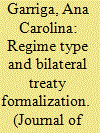

|
|
|
|
|
| Publication |
2009.
|
| Summary/Abstract |
How does domestic regime type affect bilateral cooperation, and one of its most visible manifestations, bilateral treaties? This article explains how domestic political regime affects bilateral cooperation and, contrary to the expectations of some scholars, why autocracies should be expected to be more likely than democracies to enter into bilateral treaties. If the preferences of a pair of states are not identical, the sets of agreements that each party would consent to (win-sets) need to overlap for a bilateral treaty to be acceptable. Because additional domestic constraints reduce the size of a country's win-set, autocracies should have broader win-sets than democracies. Therefore, autocratic dyads should be more likely to formalize bilateral treaties than other pairs of states. Based on an original data set, I present empirical evidence showing that pairs of autocracies are more likely than other pairs of states to enter into agreements formalizing bilateral cooperation.
|
|
|
|
|
|
|
|
|
|
|
|
|
|
|
|
| 8 |
ID:
077020
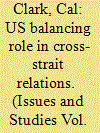

|
|
|